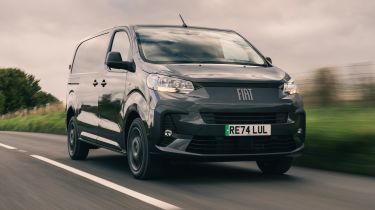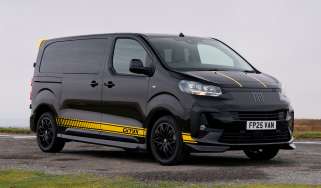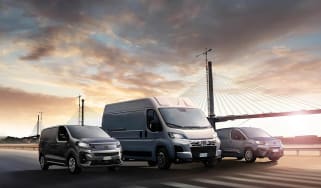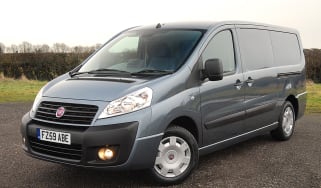Fiat Scudo review
The Fiat Scudo is a medium panel van with car-like driving dynamics and lots of equipment
Our opinion on the Fiat Scudo
The Fiat Scudo is a good mid-size panel van that drives well and has lots of standard kit, but it does miss out on a class-leading carrying capacity. If you don’t need the maximum amount of cargo volume then it could be a great choice alongside its siblings (the Vauxhall Vivaro, Peugeot Expert, Toyota Proace and Citroen Dispatch). Since all those vans are incredibly similar, the best choice for you will likely be whichever is cheapest at the time of purchase.
About the Fiat Scudo
The Fiat Scudo is a medium-sized van that’s available as a panel van and a crew van in two different lengths, and using either diesel or electric power. It’s based on a Stellantis platform that’s also used in the company’s passenger cars, but more importantly it’s also a badge-engineered van that has very similar equivalents from several other brands.
The Citroen Dispatch and Vauxhall Vivaro are the same van as the Scudo with a different nose and equipment changes, and it’s the same story with the Peugeot Expert and Toyota Proace. There are MPV versions of these vans as well with seating instead of a cargo bay, so if you’ve tried any of the wide array of siblings you’ll have a very good idea of what the Fiat Scudo is like.
Used - available now

2018 MINI
5-Door Hatch
35,580 milesAutomaticPetrol1.5L
Cash £11,995
2026 Audi
Q2
19,006 milesAutomaticPetrol1.5L
Cash £21,497
2024 Volvo
V60
53,407 milesAutomaticPetrol2.0L
Cash £23,187
2024 Volkswagen
Tiguan AllSpace
51,951 milesAutomaticPetrol1.5L
Cash £19,597The Scudo panel van is available in two body lengths, L1 and L2, and there’s a six-seat Crew Van in those two lengths as well. There is a choice of three diesel engines and one electric version called the E-Scudo.
All models are front-wheel drive only, and you can get a manual gearbox with the base diesels and an auto with the higher-powered models. Of course the electric version uses a single-speed auto, too.
Prices start from around £29,000 for the diesel, which is more than some of its Stellantis equivalents, but the E-Scudo is actually better value than the Peugeot E-Expert, for example (it starts from around £38,000, a few grand less than the Peugeot).
You can get a more powerful diesel that ups power from 118bhp to 142bhp for £1,000 more than the base van, and adding the auto gearbox is around £1,500 on top of that. The most powerful 178bhp diesel is auto-only and costs just under £46,000 since it comes in top-spec Onyx trim only.
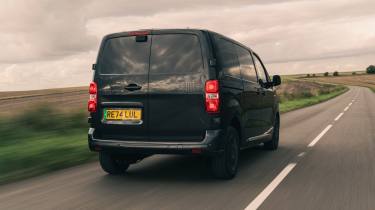
The E-Scudo has a range of up to 219 miles according to official figures (that’s about ten miles fewer than the Peugeot E-Expert and Citroen E-Dispatch) thanks to its 75kWh battery pack. You can charge it at up to 100kW, so a 5 to 80 per cent charge takes 45 minutes at a public rapid charge point. There’s also a 50kW model available with a range of 139 miles.
Trim levels are Scudo (the base trim is nameless), Primo and Onyx on the diesel and electric models. Standard kit includes a ten-inch infotainment screen with smartphone connectivity, parking sensors, twin side doors, two solid rear doors, 16-inch steel wheels, automatic emergency braking, lane-keeping assist, driver attention alert, and automatic windscreen wipers. Primo trim adds 17-inch wheels, a slightly different exterior look with painted bumpers, a load-through bulkhead and sat-nav for the infotainment screen.
Onyx is a limited-edition model with a full bodykit, special wheels and rally-style graphics on the bodywork. It’s equipped with loads of extras including keyless go, wireless phone charging, heated seats and an upgraded rear-view system for more visibility when parking. These items are available on other versions of the Scudo as options, but the 178bhp engine and graphics on the sides are exclusive to this plush top-spec van.
MPG and running costs
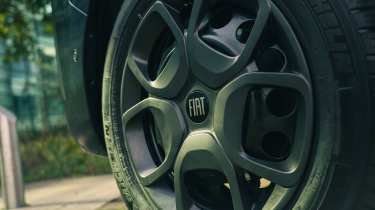
Pros |
Cons |
|
|
Official fuel economy for the Fiat Scudo diesel versions starts at 44.8mpg, which is from the 118bhp 1.5-litre BlueHDi 120 model. This is exactly the same as sibling vans such as the Peugeot Expert or Citroen Dispatch with the same engine, so there’s no advantage or disadvantage to choosing one over the other when it comes to fuel economy.
Go for the more powerful 2.0-litre BlueHDi 145 and the official economy figure drops to 38.7mpg. However, if you choose the automatic gearbox available with this engine, the figure actually rises to 39.8mpg, which might offset the slight increase in purchase price. In the real world, however, expect all these vans to deliver up to about 40mpg depending on what you carry and how you drive.
All models come with a 10-inch touchscreen display, sliding doors on both sides, a full steel bulkhead and air-conditioning. Auto wipers, parking sensors, heated mirrors, auto high beam, lane-keeping assist and wireless smartphone connectivity are included on all models, too.
Primo trim brings extras including a through-loading bulkhead, sat-nav, larger wheels and a different exterior look for a little extra cash. There’s a limited-edition Onyx version with a powerful engine, added graphics and loads of other extras, but it’s very expensive and not a serious proposition for most buyers.
You can add options including sat-nav (£650), a load-through bulkhead (£350) or an alarm (£225), although it’s a shame that the latter isn’t included as standard (it’s included on Primo trim, though).
A 180-degree reversing camera and sat-nav are available as part of the £850 “Camera Pack with Connected Navi”, which is exactly the same as on the Peugeot Expert sister van, including the price and the name - which shows just how closely related these vans are. Choose the van that has a dealer offer on when you buy, unless you really prefer the look of one or the other.
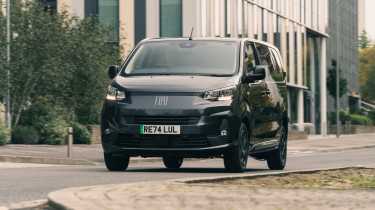
Electric range, battery life and charge time
The Fiat E-Scudo uses a 50kWh or 75kWh pack and a 134bhp electric motor driving the front wheels. The larger battery is able to bring a range of up to 219 miles according to Fiat, which is about ten miles fewer than Peugeot quotes for the electric Expert, despite the vans being pretty much the same, so take the figures with a grain of salt.
You’ll get more range if you spend time at lower speeds, around town and in heavy traffic. Electric motors are the opposite of diesel engines, in that they are most efficient at low speed and less so at motorway speeds, so if you do more long-distance trips then expect fewer miles between charges.
There is also a 50kWh option, which has a reduced range of 139 miles, but this model isn’t available in the Peugeot Expert, so might be of use to some buyers. It’s cheaper and charges a bit faster (because there’s less battery capacity to refill).
You can charge up at a maximum of 100kW, which allows for a five to 80 per cent charge in 45 minutes (38min for the 50kWh one). This is a bit low if you’re used to electric passenger cars, but it’s identical to its sibling vans from the Stellantis group and many commercial EVs have worse charging speeds than this.
You’ll need to set aside 37 hours (22.5 hours for the 50kWh model) for a charge from a normal household plug, so a 7.4kW wallbox charger is needed. This will cut that time down to 11 hours and 20 minutes (6 hours 45 min for the 50kWh), while 11kW charging - which is not always available in the UK - brings the time down even more to seven-and-a-half hours (four and a half hours in the 50kWh). You’ll also need to add the £400 optional extra that allows 11kW charging if you have access to it at home or work.
Load space and practicality
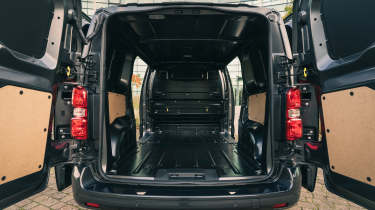
Pros |
Cons |
|
|
The Fiat Scudo has a cargo volume of 5.3 cubic metres for the L1 model and 6.1 cubic metres for the L2 model. The wheelbase doesn’t change between these versions, at 3,275mm in both, so there’s an extra 350mm of rear overhang in the L2. The two are 4,981mm to 5,331mm respectively in total.
Cargo space isn’t bad but it’s not a particular strong point in the Scudo, as a Ford Transit Custom has 5.8m3 in the normal version and 6.8 cubic metres in the longer version. The load bay is longer too, although of course you can add a through-load option in the Scudo if needed. This option opens up extra space for longer items under the passenger seat, and increases the load length from 2,512mm to 3,674mm.
There’s 1,258mm between the wheelarches, 1,636mm across the cargo bay and 1,397mm up to the roof, just like in all the Scudo’s sibling vans. The openings for the side doors are 935mm wide and 1,241mm high, which isn’t as big as some other rival vans but at least the Fiat comes with both side doors as standard. Some panel vans don't.
You can choose a Crew van model with six seats: three up front and three more next to the side doors, which come with windows in this form. The cargo area shrinks to 3.2 cubic metres (four in the longer L2 version) and measures up at 2,017mm or 2,365mm long in the Crew van, with access via the back doors only.
All of the diesel versions have a payload of over a tonne, and the best is with the BlueHDi 145 manual version, which has a maximum of 1,384kg. The electric and Crew van models have reduced capacity, and as you might expect the E-Scudo Crew van has the lowest maximum payload, at 915kg, due to the heavy battery.
You can technically tow up to a tonne in the electric versions, but you can’t buy a tow bar from Fiat anyway. You’ll want the 1.5 BlueHDi diesel to pull up to two tonnes and the 2.0 model for up to 2.5 tonnes, and a tow bar is on the options list for both.
Reliability, safety and security
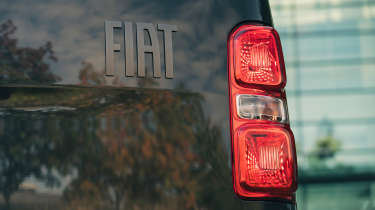
| Pros | Cons |
|
|
Standard safety kit on the Scudo includes driver and passenger airbags, lane-departure warning, driver-attention alert, autonomous emergency braking and speed-limit assist tech. It’s all thanks to the van being based on the Stellantis platform shared with many passenger cars.
The latest Euro NCAP tests showed that the Fiat keeps up with the competition on safety, as it got a four-star rating. Scores included 75 per cent for the safety kit, 52 per cent for crash avoidance and 80 per cent for post-crash safety. That’s exactly the same as the other vans based on the same architecture including the Vauxhall Vivaro.
Optional safety kit includes a 180-degree reversing camera pack, which brings front and rear parking sensors plus rear and side-view cameras that improve visibility a lot. Blind spots were covered a lot better when we drove a van with this equipped. Sadly on the base model you also have to pay to get an alarm, which is pretty crucial for security.
The diesel engines in the Scudo are all fitted to other passenger cars and vans, so parts will be widely available should they be needed. The engines are tried-and-tested units so should be as reliable as any other diesel commercial vehicle. Expect even better reliability from the electric E-Scudo because there are fewer moving parts to go wrong, even at high mileages.
Driving and performance
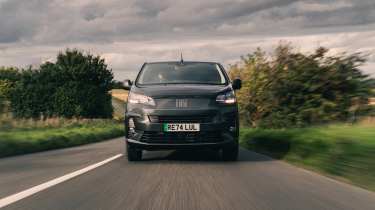
Pros |
Cons |
|
|
Thanks to the car-derived underpinnings, the Fiat Scudo drives very well on the road. It’s comfortable over bumps and noise is kept to a minimum in the cabin too. It’s quieter than a Mercedes Vito, for example, and the seats are good for long trips thanks to the good level of adjustment available. You don’t sit as high as in a Renault Trafic, and the windscreen feels a bit small, so visibility isn’t as good as in some rivals.
The diesel engines are okay at a constant throttle but rev them a bit and they can be noisy. The 118bhp model is punchy enough, so don’t feel you need to move up to the more powerful model. However, the eight-speed auto in the pricier BlueHDi 180 is smooth and much better than the notchy manual gearbox, so that’s a worthwhile upgrade.
Slightly grabby brakes and numb steering mean it’s not as good to drive as a Ford Transit Custom, but the Fiat Scudo matches its closest rivals for driving enjoyment and comfort. It’s fine when cornering and stays comfortable enough even without a load in the back, although it’s certainly smoother once there’s some weight on the suspension.
The E-Scudo is the best of the bunch to drive: it’s even more quiet and smooth than the diesel ones, and its 134bhp output means it’s powerful enough at low speeds. It can start to feel lacking at higher speed, but this version is clearly designed for town driving and not longer trips.
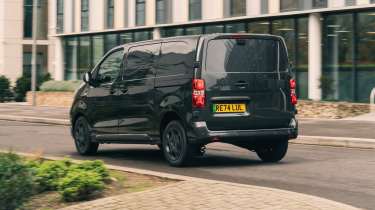
Town driving, visibility and parking
The Scudo has light steering so it’s great around town. Visibility could be better, but there’s a vision pack that adds sensors and cameras to help with that. The manual gearbox versions are a bit annoying in town as the shift is fiddly to use, so we’d prefer an auto for city use.
You can’t use one-pedal driving in the E-Scudo as the regenerative braking isn’t strong enough, but it’s still adjustable and works pretty well for slowing you down while recouping some energy.
Motorway driving and long-distance comfort
Wind and road noise aren’t bad at high speed, but both are certainly noticeable and become the main source of noise in the cabin. The engines are at their loudest when accelerating from lower speeds. Of course, the electric E-Scudo is almost silent when it comes to powertrain noise.
Cab interior and technology
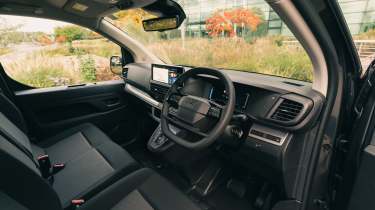
Pros |
Cons |
|
|
You sit a bit lower in the Fiat Scudo than in some of its rivals, such as the Renault Trafic, but it’s a comfortable driver’s seat with plenty of adjustment. The interior looks smart enough, with some modern touches, but the majority of the surfaces are familiar van-like hard plastics. These give it a workmanlike look in places but it’s all in the service of being hard-wearing and practical for work use.
There’s plenty of headroom and space is good for a driver and passenger, but travel three-up and it starts to get a bit cramped inside. The gear shifter is a bit close to the middle-seat passenger’s knees, so go for an auto model if you regularly carry two passengers. There’s a Crew van option for carrying more people but the rear triple-row bench seat is a little narrow in this model so it’s most comfortable with only two back there.
Access to the back is easy via the sliding doors, which have windows as standard in the Crew van (they’re optional on the panel van).
Infotainment, sat-nav and stereo
The 10-inch touchscreen display that comes as standard in the Scudo and E-Scudo is easy to use and looks fairly modern. It brings the cabin nicely up to date. Sat-nav isn’t standard but you can add it as an option, or go for the higher-spec Primo model to get it thrown in. However, we don’t think it’s needed, since wireless smartphone connectivity is included across the range. With this or via the USB-C sockets you can connect a smartphone and use a maps app to navigate anyway.
Buying and owning
There are a number of Scudo powertrains and bodystyles to choose from, so the perfect choice will mostly boil down to your business’s requirements. The fully-electric E-Scudo will be the better choice for short distance ‘last mile’ drivers as running costs will be minimal, and you’ll avoid emissions based charging such as the London Ultra Low Emission Zone.
For those who aren’t ready to make the switch to electric, we’d expect the diesel engines to realistically achieve around 40mpg in day-to-day driving. If you’re covering longer distances and taking on motorway runs, the mid-range 142bhp engine should prove adequate for keeping up with traffic, but it’ll save you a few thousand compared to the range-topping 178bhp unit.
Alternatives
The Fiat Scudo, Citroen Dispatch, Peugeot Expert and Toyota Proace are the key models to consider here, as they are all pretty much the same thing with a different nose on the front. The manufacturers will have different deals on at any given time so one may be better value than the other, so do your homework before buying. The Toyota tends to be a bit pricier thanks to its better warranty.
The E-Scudo is sort of a rival for the flash Volkswagen ID. Buzz, although that’s more of a premium van. The diesel models rival the normal Volkswagen Transporter and the Ford Transit Custom, which is one of the best vans in this class. There’s also the Renault Trafic and Nissan Primastar, which are based on the same platform, and the Mercedes Vito to consider.
Van dimensions
| |||
| Body style | Height | Width | Length |
| Scudo L1 (& Crew) | 1,904mm | 1,924mm | 4,981mm |
| Scudo L2 (& Crew) | 1,935mm | 1,924mm | 5,331mm |
Load area dimensions | ||||
| Body style | Height | Width | Length | Volume |
| Scudo L1(w/bulkhead option) | 1,397mm | 1,636mm | 2,512mm (3,674mm) | 5.3m3 (5.8m3) |
| Scudo L2 (w/bulkhead option) | 1,397mm | 1,636mm | 2,862mm (4,024mm) | 6.1m3 (6.6m3) |
| Scudo Crew Van L1 | 1,397mm | 1,636mm | 2,017mm | 3.2m3 |
| Scudo Crew Van L2 | 1,397mm | 1,636mm | 2,365mm | 4.0m3 |
Frequently Asked Questions
If you want a comfortable mid-sized van with lots of equipment then the Fiat Scudo is a good option. It’s not the best van of its type but it looks good value and the E-Scudo is particularly good for local, around-town work.

